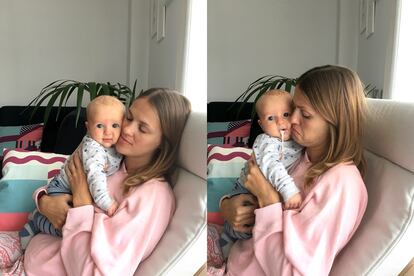‘Accepting that your child will not be created by making love... it hurts’
A new collection of poems, born from an Instagram account, reflects the hardships, sorrows and joys that today’s mothers experience

There are as many types of motherhood as there are mothers. However, they all share many common aspects, which usually differ greatly from the long-standing stereotype of motherhood. This is something that Laura Torné, writer, screenwriter and mother of two, set out to bring to light through El Embarazo de los Unicornios (The Pregnancy of Unicorns), a Spanish-language Instagram account with more than 40,000 followers hooked on her poems, full of irony and realism.
Now, many of these writings, along with some previously unpublished material, have been published as a book: La Maternidad Real en Versos y Chorradas (Real Motherhood in Verse and Nonsense), which, along with the illustrations of designer (and partner of the author) Martino Pannofino, paints an unfiltered picture of what mothers experience. The good, of course, but also the challenging, such as difficulties falling pregnant, nausea and hormonal changes, gestational mourning, labor that does not go as expected and lack of support in the postpartum phase.
Question. Is maternal realism important?
Answer. It’s not that it’s important; I’d say it should be mandatory, so reality doesn’t hit you in the face when you see first-hand what motherhood is. Before I became a mother, all I had seen or heard was how wonderful it was. Nobody told me that getting pregnant sometimes takes years, tears and money, nor did they tell me that I could spend nine months with my head in the toilet, feeling sick. They didn’t tell me about sore nipples or lactating on demand. And something much worse than any physical discomfort: that when your baby is born you may feel that you don’t love him or her as much as you had imagined, which plunges you into a very dark place.
Q. Maternal experiences can be very different, but also very similar. What makes motherhood real?
A. Motherhood is stages, moments, like the chapters of the book, and we all go through (almost) the same ones. But we can experience them one way or another because we have different ways of understanding maternity and different ways of raising children. But all of us, absolutely all of us, need to be supported and respected in our experiences, to feel that we are doing well. We need to be ourselves and to be able to talk about things as they are, unfiltered. For me, that is real motherhood. There are still many women who don’t dare to talk about what is going on with them, who soften what is happening out of guilt.
Q. They feel guilty, but also invisible…
A. Yes. Invisible, and I even think that we often feel like an annoyance. We see it in society in general and in many contexts in particular: at work, on the bus, if your child cries, with the family, when they only come to see the baby and disregard your needs.
Q. You mentioned earlier that getting pregnant sometimes takes years, tears and money. Why would you say that it is so difficult for so many women to become mothers?
A. Because it still seems like you have to choose between your work life and your personal life. Women today want everything: to fulfill our professional and personal dreams, be it having children, writing a book or getting home early to binge a series. It doesn’t matter what we want. The point is that you can aspire to everything, but they don’t make it easy for us, and work and money end up weighing heavily on the balance.
Saying that you can’t have children naturally, makes you feel less of a woman. Until you understand that that is not the case
Q. “Son, you cost us so much in so many ways... But our pocket was undoubtedly what hurt the least,” you write. What is most difficult, emotionally?
A. The most difficult thing was without a doubt thinking that, despite all that we put into it – and I don’t mean money, although there’s that, too, but I’m talking about the excitement, energy and hope – we still could have never succeeded in becoming parents. At least not that way.
Q. Do women, who can’t have children naturally, mourn that experience?
A. Yes, there is also mourning there. An internal struggle with yourself and, at the same time, with the people around you. Saying that you can’t have children naturally, shamefaced, makes you feel less of a woman. Until you understand that that is not the case, and you say it without reservation, out loud. And well, accepting that your child will not be created by making love, that there will be no romanticism in it... it hurts. But once you get into the process, you have to know how to be excited about it.
Q. Would you say that there is a socially accepted idea that women are always in time to become mothers?
A. Of course. And I think it’s a mistake. Of course, with science, there are more opportunities to be a mother as time goes by. The point is to be aware of this, that when the time comes you may need this help. A help that costs money and headaches, tears and going through the mourning that we mentioned.
Q. What are your thoughts regarding those who say “relax and get pregnant”?
A. That it’s the same as believing in magic. If you want to believe, believe, but there is always a trick behind it, my friend. And yes, stress doesn’t help at all. But how does a woman, who wants to get pregnant and can’t, manage to relax and reach Nirvana? To relax, you would have to forget about the whole thing, and that’s impossible when you’re doing this. Take it from someone who has tried a thousand times, in a thousand different ways. It doesn’t work.
Q. We have talked about the mourning of expectations, but there is another grief that is very hard to talk about. “The one that make the world afraid, the one that is not talked about, the ones that is scary to mention.” Why is it still so difficult to bring up perinatal grief?
A. I’d like to think that it’s out of respect, to avoid stirring up that mother’s pain, but I think it’s more due to a lack of understanding or empathy. People who have not experienced it don’t believe that it can be so painful and, thus, so important.
Q. “No heartbeat” is the phrase no woman wants to hear.
A. When I wrote the poem No Heartbeat I based it on the testimony of women who had lost their child. I hadn’t experienced it yet. And when it happened to me, at nine weeks of the second pregnancy, I was able to truly understand them. Their pain, their grief, their helplessness. That feeling of having lost a child that you already loved, of emptiness, and on top of that having to go on living your life as if nothing had happened.
Q. Is humor important in the midst of so much maternal drama?
A. Always! I like to say that motherhood goes better with humor. Hence the title of the book, Real Motherhood in Verse and Nonsense. May we never be short of nonsense and silliness. Not only motherhood, but also life, is much better this way.
Tu suscripción se está usando en otro dispositivo
¿Quieres añadir otro usuario a tu suscripción?
Si continúas leyendo en este dispositivo, no se podrá leer en el otro.
FlechaTu suscripción se está usando en otro dispositivo y solo puedes acceder a EL PAÍS desde un dispositivo a la vez.
Si quieres compartir tu cuenta, cambia tu suscripción a la modalidad Premium, así podrás añadir otro usuario. Cada uno accederá con su propia cuenta de email, lo que os permitirá personalizar vuestra experiencia en EL PAÍS.
¿Tienes una suscripción de empresa? Accede aquí para contratar más cuentas.
En el caso de no saber quién está usando tu cuenta, te recomendamos cambiar tu contraseña aquí.
Si decides continuar compartiendo tu cuenta, este mensaje se mostrará en tu dispositivo y en el de la otra persona que está usando tu cuenta de forma indefinida, afectando a tu experiencia de lectura. Puedes consultar aquí los términos y condiciones de la suscripción digital.









































